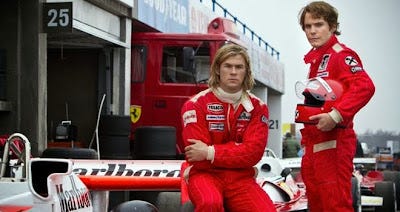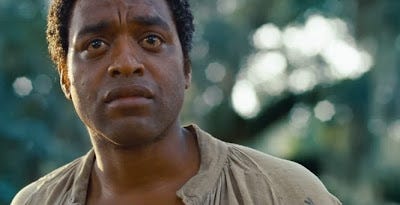2013 Movie Review Round-up #1 - Rush, Prisoners, Captain Phillips, & 12 Years a Slave

This has been a strange year for me. 2013 started out with one of the longest, most excruciating dearths of original cinematic content I have ever seen in my time as critic, and around August, a combination of bad-movie fatigue and other responsibilities – schoolwork, a new job opportunity, applying for a graduate school program, etc. – saw my movie review productivity drop to the lowest level I think it has ever been since I started writing about film.
And somewhere during that time period, 2013 got good. Not just good, but great. When I wasn’t quite looking – or was looking, but didn’t have time to write about it all, which is my main method of processing film – 2013 revealed itself as one of the deepest and most eclectic years for cinema in recent memory. I was seeing a lot of movies, and being slowly but steadily impressed by most of them, but I was also missing more than I would prefer to – and not writing about any of them, which for me was the biggest disappointment.
As 2013 enters the home stretch, however, it’s come time for me to start thinking about my year-end Top 10 list, and about what films and performances I feel worthy of merit, as I shall soon be voting alongside the Denver Film Critics Society for our annual awards. That means I’m up to my neck in screener DVDs – the studios routinely send out all their award hopefuls to guilds and critics groups for year-end consideration – and finally have a chance to catch up on everything I’ve missed.
That has been a fun process so far, and it also inspired me to go back and play catch-up on all the movies I failed or lacked the time to review. This will be a multi-part feature that will extend over the next few weeks, with each post offering mini-reviews for about four or five movies as I see and write about them. Since the last regular review I wrote before my long break was in late September, and published in early October – for Alfonso Cuaron’s Gravity – I decided to start this project by recapping all the films I saw in theatres during that period, new releases I had been to see relatively close to their debuts. That will be split into two columns – the one you are reading now, focusing on the films of October, and another posting later in the week, on the films of November – and in the next installments, we shall cover some screeners I have finally gotten around to catching up on. A mix of full reviews – published over at We Got This Covered – and more mini-review columns like these should bring us to the end of the year in good fashion.
Read on after the jump for mini-reviews of Rush, Prisoners, Captain Phillips, and 12 Years a Slave...
Rush

Far and away the best film Ron Howard has made since 1995’s Apollo 13, and possibly my favorite work of his to date (though some Howard films others enjoy, like A Beautiful Mind, drive me positively insane), Rush is the historical narrative at its best, a stirring evocation of the infamous 1976 Formula One racing season that doubles as both a tremendous character study and one of the sharpest, smartest portraits of masculinity in modern mainstream film. Chris Hemsworth and Daniel Brühl are each spectacular as James Hunt and Niki Lauda, respectively, with Brühl’s mastery of his own face and facial expressions recalling the works of the silent film greats. Howard’s direction and Anthony Dod Mantle’s cinematography are positively inspired, and alongside Man of Steel and 12 Years of Slave, this is one of three truly great Hans Zimmer scores of the year. In a less crowded season, I could easily see this taking a spot on my personal Top Ten – that it is unlikely to break those ranks speaks only to the density of 2013 as a whole, and not to any shortcomings here.
Prisoners

Here’s a film I went into knowing absolutely nothing about – I’d seen no trailers, read no reviews, heard no reactions. Somehow, it flew completely, 100% under my radar, and I would up seeing it on a whim based solely on Hugh Jackman, Jake Gyllenhaal, Viola Davis, and all the other great names on the poster. Densely plotted, structurally novelistic, and as morally and intellectually complex as any film I’ve seen all year, Prisoners wound up being a revelation for me, a superb crime procedural that gets exponentially deeper and richer as it moves along, right up to its closing moments. As an emotionally struggling, ethically compromised father, Hugh Jackman gives what I think is undoubtedly the best performance of his career, while the grounded work Jake Gyllenhaal does as a detective fighting to stay cold and detached during the most horrific investigation of his career is outstanding. The film doesn’t do nearly as well by its female cast members as I would have liked – Maria Bello is unfortunately wasted, while Davis has only one scene to truly shine – but that is the only major complaint I can lodge against this impossibly dark gem. Factor in the brilliant, haunting cinematography by the great Roger Deakins and sharp direction from Denis Villeneuve, a filmmaker whose prior work I am unfamiliar with, and this is definitely one of the year’s best, albeit one that has, to my eyes at least, been oddly underrated.
Captain Phillips

This has been a year in which I have had extreme, visceral reactions to several films, sudden outbursts of emotion prompted by the brilliance of the art or my depth of connection with the piece. Captain Phillips was different, however. Director Paul Greengrass has become so absurdly good at crafting cinematic tension, and here finds such a deep and complex thematic gear in which that tension operates, that my own visceral reaction to the film – feeling physically tense, literally moving to the edge of my seat, finding myself pausing for increasingly long durations between breaths – lasted from about the 45-minute mark all the way on to the end, at which point I felt nearly as broken and conflicted as the title character. It’s not just Greengrass’ ability to manipulate the audience into a state of heightened, tense fervor over the stakes and the action; doing so with this level of success is no easy feat, and is a testament to his command over all aesthetic and rhythmic elements of the picture, but there is more to the film’s success than that.
What I find most fascinating and engaging is that, at the moment the Somalian pirates board Captain Phillips’ ship, there is a small, subliminally perceptible shift in the direction of tension, where I start to fear more for the pirates – who, in boarding an American vessel and encouraging the wrath of the United States, have gotten completely, unknowably in over their heads – than I do for Phillips or his men. And as the film continues, and various levels of American military get involved, and the jaws close tighter and tighter around the pirates and their captive, that balance only shifts more and more and more. Greengrass is not the kind of director to make explicit political statements, but in this dynamic balance of tension, I think he says more about America’s potentially horrific might and the platitude of internationality than most modern films on the subject ever have. It is not an anti-American film – even as the pirates are fleshed out into characters and their motives made understandable, the blame for this incident is never fully removed from their hands – and part of the emotional impact is the sheer, complex, impossible-to-solve nature of the situation, but the ways in which it is politically critical and insightful are fascinating to me, and exponentially increase the film’s visceral power.
Special mention must, of course, be given to the two lead performances. As the pirate captain, unknown actor Barkhad Abdi does amazing, multi-faceted work, serving as an endlessly complex antagonist until it is clear the negative power at play is far larger than any one person, and then transitioning seamlessly into the damaged, conflicted, and tragic heart and soul of the picture. Tom Hanks, meanwhile, challenges himself to newfound degrees playing the eponymous Captain, playing small and building his performance on a vast wealth of subtle human details before building his work to a horrified, chaotic fever pitch in the final act. The film’s terrifying final moments probably represent the best work Hanks has ever done, and that is no small praise. Captain Phillips, both the performance and the film, are an absolute revelation.
12 Years a Slave

Steve McQueen is undoubtedly one of the best filmmakers working today. His previous feature, the Michael Fassbender-starring Shame, was my top film of 2011 (and remains, I believe, one of the absolute best films of the decade so far), and 12 Years a Slave only continues his artistic hot-streak. A blisteringly brutal, honest, sharp, and at times overwhelmingly emotional account of Solomon Northrup, a free black man sold into slavery in pre-Civil War America, the precision of McQueen’s artistry – particularly regarding his command of the shot, and the amount of meaning he is able to impart between edits, whether the take is daringly long or beautifully fleeting – is largely unparalleled, and what impresses me most is the unbelievable level of calm, measured control McQueen exhibits over the entire affair. This is so far removed from how I imagine the overwrought ‘Hollywood’ version of this story playing out, with McQueen not only taking the time to let each beat of the story play out in full, but never turning away from the physical and emotional horrors at the heart of the narrative.
It is a great, instantly canonical film, positively littered with terrific performances both large and small. The work done by Chiwetel Ejiofor in the lead role is on another level, though, a performance built on subtlety and restraint, on facial expressions and body movements, in which ‘big’ moments matter because they stand out from what is otherwise a dense, richly humanistic portrait. I cannot imagine another actor doing better work than this in the part, nor can I imagine many performers resisting the urge to go ‘big’ throughout, as that is the default position for leads in historical dramas.
Given my high expectations going in, it is hard to say 12 Years a Slave surprised me, but like many of the year’s best films, I walked out of the theatre deeply shaken – in this case, in an almost trance-like reverie contemplating everything I had just experienced. This is a film that will be shared and discussed for as long as the art form remains relevant, and easily one of the highlights of 2013.
Come back for the next ‘Review Round-Up’ column, in which we’ll move into November and look at “Blue is the Warmest Color,” “Thor: The Dark World,” “The Hunger Games: Catching Fire,” and “Frozen.”
Follow Jonathan Lack on Twitter @JonathanLack.

